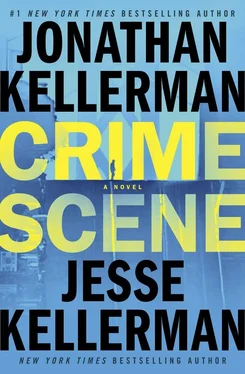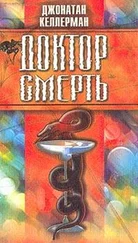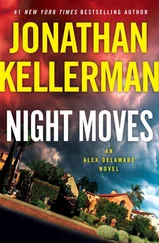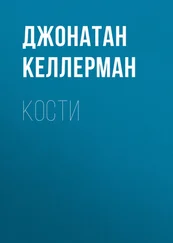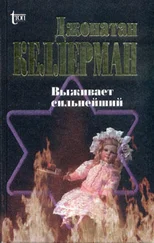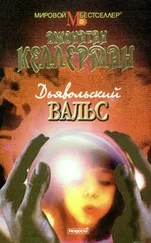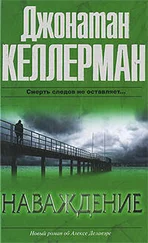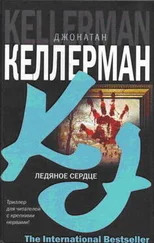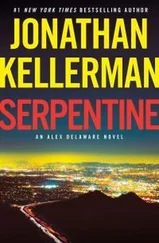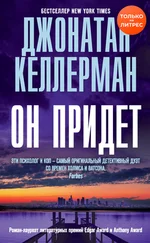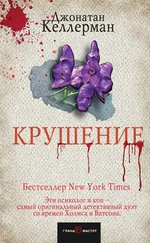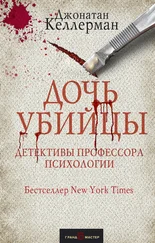I didn’t have the heart to tell her that her father hadn’t been much of a photographer. The folder contained around a hundred pictures, many of which were duplicates. Still, there were a handful of shots she’d want, the two of them together.
“It means a lot to have these.” She clasped the envelope to her chest. “Any scrap.”
I nodded.
She said, “I feel like I should offer you coffee. Is that what I’m supposed to do?”
“You don’t have to do anything.”
“Please. You took the time. I don’t have any coffee. I have tea. Do you want tea?”
All around us, the sky was embers.
I said, “I wouldn’t turn down a glass of water.”
She stepped back to admit me.
Over the years, I’ve had the misfortune to tour some of California’s most breathtakingly slovenly homes. Compared with, say, a crack house, Tatiana’s apartment felt positively airy, even with large portions of it swallowed by banker’s boxes and sliding piles of paper. Shrink-wrapped five-packs of unbuilt boxes leaned against the wall, waiting to be born, eager to get fed.
She led me along a path cleared through the living room, toward the kitchenette.
“Sorry about the mess,” she said. “I’m kind of in the weeds here.”
She took down a glass from the cabinet, a filter pitcher from the fridge. “Please, sit.”
I couldn’t. Boxes occupied the kitchen chairs; a paper mosaic on the table. Bank statements and insurance statements and bills, some of them years old, addressed to Walter Rennert or a trust bearing his name.
Tatiana finished pouring and turned to see me still standing. Hurriedly she set the glass aside, stacking documents up and dumping them in an open box.
“I’m the executor,” she said. She slapped the box top on. “Surprise!”
She cleared off chairs and handed me the glass, and we sat.
“You didn’t know?” I asked.
“He didn’t bother to tell me.” A thin bitter edge, swiftly trimmed away: “I’m the logical choice. Stephen’s in Boulder, Charlie’s in New York. They have their own lives.”
The implication being that she did not?
I took a drink. I’d made the glass my clock. Once the water ran out, I would, too.
“Dad had enough sense to divide the assets three ways,” she said. “At least we don’t have to fight about that.”
As siblings, they’d looked happy enough in their childhood photos. But now money was involved. I gave a noncommittal nod.
She sighed and hooked one leg under herself, spine straight as a candle, chest out, as though presenting herself for military inspection. Freckles strewn across her collarbones; bottom lip swollen in a sweet pout; wide-eyed at the avalanche lying before her.
“You probably can’t tell,” she said, “but I’m a minimalist by nature.”
I could buy that. Edit out the inherited clutter and you saw little in the way of ornamentation. Black-and-white posters hastily slapped up with tape; a ukulele on the futon. A stack of cookbooks and some dried-out flowers standing in a repurposed milk bottle. It looked more like the dwelling of a recent college grad, giving the impression that she’d just moved in. Or that she was on her way out soon. Or that she couldn’t decide.
She said, “The lawyer — he did have one, by the way — he’s helping, but it’s still a ton of work, mostly cause my dad was so disorganized. I have to get everything appraised. The art... I’ve been going through his credit card statements. He’s signed up for all this stuff, bogus subscription services or ‘fraud alerts’ or whatever. The kind of sneaky shit a normal person notices and cancels. He had three dozen bank accounts, and each of them is shooting out checks on a monthly basis to God knows where. Plus he keeps his records in his basement, which fills up when it rains, so everything from about” — chopping her shin — “here down has water damage. I can’t be there for more than five minutes, it sets my allergies on fire, so I’ve started schlepping it here. Four trips and I’m still not done.”
I thought she might have another, unstated motive: she couldn’t bear to be alone in a big, hollow house, listening to her father’s ghost repeatedly crash down the stairs.
“Whatever.” She shook off her irritation, smiled. “So you said you live nearby?”
“Lake Merritt,” I said.
“Oh.” The smile took on a gloss of confusion. “That’s cool.”
I’d be confused if I were her, too. I was nowhere near home. Nevertheless I was glad to have found a neutral topic. “It helps if you like geese.”
“Do you?”
“They’re okay to look at,” I said. “Up close? They’re kind of assholes.”
She snorted. “I know people like that. For some reason they all seem to come to my yoga class.”
I asked where she taught.
“It’s a side thing. Mainly I dance. What about you?”
I said, “Uh. Well—”
She slapped a hand over her mouth. “Oh my God. I can’t believe I just asked you that.” She started to laugh.
“Reflex,” I said.
“Exactly.”
“To be fair,” I said, indicating the Cal sweatshirt, “I’m in disguise.”
She grinned. She had beautiful teeth, and I’ve seen my fair share of teeth.
“Yes,” she said. “ Exactly. Thank you. It’s your fault.”
I laughed, too, over my discomfort. That she’d asked the question, even inadvertently, called attention to the irregularity of my presence. It was the sort of question you asked a blind date.
I drained the water and stood to place the glass in the sink.
“Let me, please,” she said, taking it from me. “Can I get you anything else?”
“No, thanks.”
“Thank you for the photos.”
“My pleasure. Good luck,” I said, or meant to say. I didn’t get it out before she spoke again:
“You know, I recognized you.”
I said nothing.
“At the house? I thought — when you introduced yourself, I mean, you’re like” — she waggled her hand above her head, meaning tall. “I wasn’t sure until you gave me your card.”
“You went to Cal,” I said.
“Oh-seven.”
“I was oh-six.”
“I know,” she said. “I looked you up, just to make sure I wasn’t imagining things. It was reassuring, in a way. Oh my God, I know him. Even though I don’t, really. That’s strange, right, for me to think that?”
I shrugged. “Not that strange. It happens. People feel a connection.”
“You’re used to being recognized.”
“We’re not talking about I’m famous.”
“Kind of, you were.”
I brought my thumb and forefinger close together. “That much.”
Narrowed them further, so they were almost touching. “For that long.”
“I never went to any games,” she said. “Is that terrible?”
“It is,” I said. “I’ll still help you, though.”
She laughed. “Cause that’s the kind of guy you are.”
I smiled, shrugged again.
“It was a thing that year,” she said, “the basketball team.”
It was. I was.
“I’m sure that’s why I didn’t go,” she said. “On principle. I was artsy. I’m sorry.”
I waved her apology away.
“Do you miss it?” she asked.
“Not really.”
“Not even a little?”
“I don’t mean that it was easy to stop,” I said. “It’s not like I had a choice.”
“And now?” she said. “Why this?”
“My job, you mean.”
She nodded.
“Why do you do what you do?” I asked.
“Because my mother put me in ballet slippers before I could walk.”
So far she hadn’t given any indication she could smell me, either the decomp or the Febreze. But I realized with a start that I could smell her. Scent has a role in my work; it’s another tool in the kit, and my nose has grown both highly attuned and not easily bothered. Every body, living or dead, has its own unique perfume. Tatiana’s was dark and rich and alive as she leaned toward me.
Читать дальше
